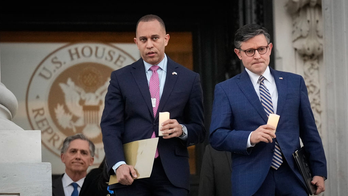
Most intelligence officials say Ayman al-Zawahiri, right, will lead Al Qaeda after Usama bin Laden, but many question Zawahiri's charisma to inspire new members. (Reuters)
With the leader of the world’s most feared terrorist organization dead, speculation is rampant about who will become the next leader of Al Qaeda.
Most intelligence analysts believe that Al Qaeda's acknowledged number two in command, Ayman al-Zawahiri, will assume that position. Indeed, a $25 million reward for his capture may be the best evidence that he is already the de-facto Al Qaeda leader.
But Zawahiri's credentials are not without blemish.
The 59-year-old Egyptian-born physician is known as an intellectual -- fluent in French as well as Arabic -- whose uninspiring focus on details and doctrinaire approaches to his cause come at the expense of charisma. Many speculate that he may be incapable of inspiring future generations of potential jihadists.
"Al Qaeda is now a franchised operation with so many different parts, a really global brand that needs a new face and a new voice, and I think Zawahiri doesn’t quite fit that bill. He's not inspiring enough, not close enough to the youths largest recruiting pool," says Shuja Nawaz, the Director of the South Asia Center in Washington, D.C.
Even assuming his succession to the leadership post , Zawahiri may be in no position to execute any responsibilities, owing to the "treasure trove" of intelligence Navy SEALs removed from bin Laden's compound in Pakistan.
"It's the largest cache of intelligence information gotten from a senior terrorist that we know of," National Security Advisor Tom Donilon told Fox News' Chris Wallace on Sunday. "It's size of a small college library. It will need to be translated. It will need to be assessed. It will need to be reviewed. And we're in the process of doing that."
While that analysis is underway, intelligence experts suggest Zawahiri will likely lay low and limit communication. That necessity to remain quiet and in deep hiding may render Zawahiri impotent to order further attacks in the foreseeable future.
Others in the leadership of Al Qaeda may clamor to fill the void created by his absence.
One possible candidate is the American-born cleric, Anwar Awlaki, now based in Yemen. Having narrowly escaped a U.S. drone attack last week, Awlaki is described as harboring some of the charismatic traits and an appeal to young people that Zawahiri lacks.
"He's fluent in English and in Arabic,” says Nawaz. “His Arabic, the way he enunciates words, is very reminiscent of Usama bin Laden."
But Awlacki's carries his own inherent liabilities. His American heritage may present a formidable weakness in a hierarchy that prefers its leadership to be Arabic. And his location in Yemen, far removed from the Al Qaeda hotbed in the lawless regions of the Pakistan Afghanistan border, may preclude his rise.
Another potential candidate to head Al Qaeda is Anas Al-Libi, 47, from Libya. Libi, who recently lived in the United Kingdom, was indicted in the Southern District of New York for his alleged involvement in the bombings of the U.S. embassies in Dar es Salaam, Tanzania, and Nairobi, Kenya, on August 7, 1998. Al-Libi is known to be a competent recruiter of young Jihadists in part through his use of inspirational videos. But some doubt he has the track record or gravitas to assume the mantle.
Still another potential successor to bin Laden is Ilyas Kashmiri, a Pakistani terrorist who has risen to an Al Qaeda leadership post in recent years. Kashmiri is based in the remote tribal regions of Pakistan. He is said to have been inspired by the terrorist attacks on the Mumbai , India Marriott Hotel in which more than 200 people were killed.
But questions surrounding who will become the next bin Laden may be a secondary concern to the reality of present day Al Qaeda. Some doubt, despite the wealth of intelligence recovered from the Abbottabad compound, that al Qaeda really is functioning as a top down hierarchy, as it was in the days of 9/11. Its leadership has been severely degraded by 10 years of war and sophisticated eavesdropping.
The recently released photo of bin Laden, alone, watching himself on TV in a cold, dark room may be a metaphor for the present-day terrorist organization. Some analysts describe it's functioning now as analogous to a cancer. Leaderless, it metastasizes randomly, and haphazardly, feeding on local issues which may be of deep concern in one part of the world, but of little concern in another part of the world.
If that's an accurate picture, the war on terror may have largely been won, but it's a victory that can be undone at a moment’s notice.




